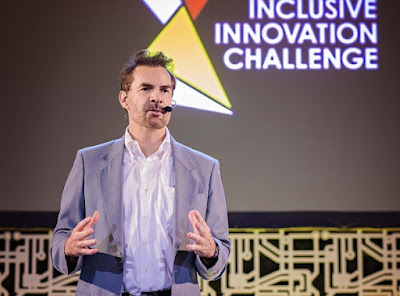The Massachusetts Institute of Technology's Initiative on the Digital Economy is directed by Erik Brynjolfsson (1962–).
He is also a Research Associate at the National Bureau of
Economic Research and a Schussel Family Professor at the MIT Sloan School
(NBER).
Brynjolfsson's research and writing focuses on the
relationship between information technology productivity and labor and
innovation.
Brynjolfsson's work has long been at the focus of debates
concerning how technology affects economic relationships.
His early research focused on the link between information
technology and productivity, particularly the "productivity
conundrum." Brynjolfsson discovered "large negative associations
between economywide productivity and information worker productivity,"
according to his findings (Brynjolfs son 1993, 67).
He proposed that the paradox may be explained by effect
mismeasurement, a lag between initial cost and final benefits, private benefits
accumulating at the expense of the collective benefit, or blatant
mismanagement.
However, multiple empirical studies by Brynjolfsson and
associates demonstrate that investing in information technology has increased
productivity significantly—at least since 1991.
Information technology, notably electronic communication
networks, enhances multitasking, according to Brynjolfsson.
Multitasking, in turn, boosts productivity, knowledge
network growth, and worker performance.
More than a simple causal connection, the relationship
between IT and productivity constitutes a "virtuous cycle": as
performance improves, users are motivated to embrace knowledge networks that
boost productivity and operational performance.
In the era of artificial intelligence, the productivity
paradox has resurfaced as a topic of discussion.
The digital economy faces a new set of difficulties as the
battle between human and artificial labor heats up.
Brynjolfsson discusses the phenomenon of frictionless
commerce, a trait brought about by internet activities such as smart shopbots'
rapid pricing comparison.
Retailers like Amazon have redesigned their supply chains
and distribution tactics to reflect how online marketplaces function in the age
of AI.
This restructuring of internet commerce has changed the way
we think about efficiency.
Price and quality comparisons may be made by covert human
consumers in the brick-and-mortar economy.
This procedure may be time-consuming and expensive.
Consumers (and web-scraping bots) may now effortlessly navigate
from one website to another, thereby lowering the cost of obtaining various
types of internet information to zero.
Brynjolfsson and coauthor Andrew McAfee discuss the impact
of technology on employment, the economy, and productivity development in their
best-selling book Race Against the Machine (2011).
They're particularly interested in the process of creative
destruction, which economist Joseph Schumpeter popularized in his book
Capitalism, Socialism, and Democracy (1942).
While technology is a beneficial asset for the economy as a
whole, Brynjolfsson and McAfee illustrate that it does not always benefit
everyone in society.
In reality, the advantages of technical advancements may be
uneven, benefiting small groups of innovators and investors who control digital
marketplaces.
The key conclusion reached by Brynjolfsson and McAfee is
that humans should collaborate with machines rather than compete with them.
When people learn skills to participate in the new age of
smart machines, innovation and human capital improve.
Brynjolfsson and McAfee expanded on this topic in The Second
Machine Age (2014), evaluating the significance of data in the digital economy
and the growing prominence of artificial intelligence.
Data-driven intelligent devices, according to the authors,
are a key component of online business.
Artificial intelligence brings us a world of new
possibilities in terms of services and features.
They suggest that these changes have an impact on
productivity indices as well as our understanding of what it means to
participate in capitalist business.
Brynjolfsson and McAfee both have a lot to say on the
disruptive effects of a widening gap between internet billionaires and regular
people.
The authors are particularly concerned about the effects of
artificial intelligence and smart robots on employment.
Brynjolfsson and McAfee reaffirm in Second Machine Age that
there should be no race against technology, but rather purposeful cohabitation
with it in order to develop a better global economy and society.
Brynjolfsson and McAfee argue in Machine, Platform, Crowd
(2017) that the human mind will have to learn to cohabit with clever computers
in the future.
The big difficulty is figuring out how society will utilize
technology and how to nurture the beneficial features of data-driven innovation
and artificial intelligence while weeding out the undesirable aspects.
Brynjolfsson and McAfee envision a future in which labor is
not only suppressed by efficient machines and the disruptive effects of
platforms, but also in which new matchmaking businesses govern intricate
economic structures and large enthusiastic online crowds, and vast amounts of
human knowledge and expertise are used to strengthen supply chains and economic
processes.
Machines, platforms, and the crowd, according to
Brynjolfsson and McAfee, may be employed in a variety of ways, either to
concentrate power or to disperse decision-making and wealth.
They come to the conclusion that individuals do not have to
be passively reliant on previous technological trends; instead, they may modify
technology to make it more productive and socially good.
Brynjolfsson's current research interests include
productivity, inequality, labor, and welfare, and he continues to work on
artificial intelligence and the digital economy.
He graduated from Harvard University with degrees in Applied
Mathematics and Decision Sciences.
In 1991, he received his doctorate in Managerial Economics
from the MIT Sloan School.
"Information Technology and the Reorganization of Work:
Theory and Evidence," was the title of his dissertation.
~ Jai Krishna Ponnappan
You may also want to read more about Artificial Intelligence here.



